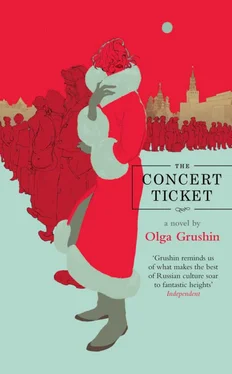He handed his documents to the guard in a booth, shifted from foot to foot, listened to the snow moaning under his shoes. The shoes, more than a decade old, pinched.
“Proceed,” the guard said.
“But my papers—”
“Proceed. You’ll receive them upon departing.”
The guard’s stare was a lengthy coda.
He hesitated for an instant, then walked in.
There was the briefest glowing, astonishing glimpse of marble and crystal set aflame and multiplied in a great mirrored chamber visible through a succession of doorways just ahead; but already he was being ushered into a small windowless room, no different from any of the rooms in which his life customarily took place. The security search was thorough and humiliating. When it was over, he was swept along a blind corridor and down a service staircase to another windowless room, where a few of them already waited, standing awkwardly along the walls, bleak brasses gleaming, strings lifeless in their black coffins; he noticed Sviatoslav in the corner, looking oddly deflated behind the bloated barrels of his drums.
There was only one chair in the room, next to a desk piled high with folders; in the chair sprawled a sleek-haired man in a much nicer suit than his own. The man was talking. Too anxious to follow the speech—something about the honor to have been selected as the State’s representatives in this bastion of foreign power, the trust that had been accorded them by the country—Sergei looked around the room, nodded to a couple of acquaintances, shifted his hold on the tuba. As his wedding ring grazed it, the metal emitted a loud, hollow clang, and he found the man’s lead-colored eyes boring into his. “And do not, I repeat, do not, address or make eye contact or communicate in any way with any of them,” the man said, holding Sergei with his flat, lusterless gaze. “Naturally, there is no need to remind you of the scrutiny to which each and every one of you will be subjected during and after this evening.”
He smiled a thin, ominous smile and, leaning forward slowly, tapped the stack of folders on the desk. The dry sound of his knuckles scratching cardboard made Sergei’s skin grow clammy, as if a nail had been deliberately dragged along a windowpane.
For a moment there was absolute stillness in the room.
“Dismissed,” the man said, and, looking thoroughly bored, reached for a drawer.
Already across the threshold, Sergei cast a glance back.
The man was clipping his fingernails.
A different corridor filled with the disconcerting echoes of invisible sentries’ footsteps, always seemingly marching toward them yet never arriving, led them farther down, to the basement, where the rest of the orchestra, some twenty of them altogether, had by now gathered. Another man, this one in a resplendent tuxedo, strode past them, briskly distributing sheets of music. Breathlessly, Sergei watched the tuxedo’s officious progress across the room. At last his fingers closed over his own set of pages, and a swift, chilled, delicious gust of anticipation blew through his chest, cleansing it of fear. Anyone chosen for these events signed an oath not to disclose anything witnessed or performed, but he had heard rumors, whispered half-confidences amidst deafening cacophonies of wearying parades, semi-voiced intimations of flight, of daring—enough to convince him that music from Over There was nothing like the turgid State-sanctioned drivel that drowned his lungs every day—enough to make him believe that tonight he would finally have something real, something special, to play, something to justify all the hours, the years, of practices, his neighbor stabbing the floor beneath his feet with her broom, his son slamming his door shut, his wife tiptoeing past him, massaging away her headache, careful not to lift toward him her dull, tortured gaze…
“We’ll be coming for you around nine. We trust that is sufficient,” the man in the tuxedo said from the doorway, and, stepping outside, closed the metal-bound door behind him.
Sergei barely registered the key forcing the lock. Impatiently, clumsily, he tore at the score, skimmed the first page, and the second, then brought the notes closer to his eyes; the lamps in the basement burned low. A stretch of time passed. As the hum of blood receded from his temples, he could suddenly hear pipes gurgling softly in the bowels of the place, a steady rhythm of water dripping somewhere from a forgotten faucet, the wheezing of an overweight trombone player behind him. He turned a page, frowning, scanned another song, felt his insides yawn with a premonition of emptiness, condensing already into bitter disbelief.
Someone issued a cough, someone else set his score down on a chair.
“Shall we try this, then?” inquired a hearty voice. “Has everyone familiarized themselves with the spirit of the thing?”
They cocked their instruments at the ready, began to play; and as one trite little ditty replaced another, their sounds floated about the basement, weightless as soap bubbles.
At seven o’clock, trays of food and drinks were brought in. There were tiny round flaky pastries and tiny elongated crispy pastries, delicacies stuffed with melted cheese and bits of olives, sprinkled with caviar, speckled with strange, strong-flavored meats and spices, tall glasses of emerald-green and azure-blue liquids stitched through with strings of bubbles yet not inebriating in the least. They took a break, and many started to laugh, grew flushed with excitement; Sergei alone remained seated, staring into space, the score still crucified on the note stand before him. Sviatoslav lumbered over, nudged him with a shiny elbow of his worn suit.
“What do you think this is? And have you tasted that?” he shouted, crumbs mingling with beads of sweat in his quivering mustache. “Smell it, smell it, isn’t it heavenly?”
Sergei nodded vaguely, though he could smell nothing; he had been born without a sense of smell—a minor nasal deviation, he had been told as a child. “I’m not hungry,” he said.
“Go on, go on, try this, you’ll thank me later. What’s with you, are you sick?”
He scraped something many-layered and brittle off the drummer’s palm, ate it without noticing its taste.
“Out of this world, isn’t it?” Sviatoslav sighed, spraying him with spittle.
“It sure is,” Sergei replied, and looked away.
At a quarter to nine the door opened again, and they were each handed a spotless white shirt with a tight collar, and a tuxedo jacket with a moist white bud in a buttonhole. “No one will be able to see your pants, the way the stage is set up,” they were told as they dressed. Afterward, they were led upstairs, into the chamber Sergei had glimpsed hours before, and there installed amidst the marble and the crystal in all their above-the-waist black-and-white splendor. The double doors swung outward, the ball began. Pausing between tunes, Sergei caught glimpses of glasses touching with expensively muted peals, pale green-and-silver sofas diminishing endlessly in the misty distance of the mirrors like waves of an elegant, silk-textured sea, the low notes of men’s placid chins pushing forward from beneath black masks, the high notes of women’s sharp chins peeking out from underneath rose-tinted masks, and lights, lights, lights, in candelabra, in chandeliers, flitting like a flock of dizzy moths under a ceiling so grand it hurt one’s neck to look up.
Sergei did not look up.
At midnight the clocks started to chime in the corners, the tall windows were thrown open, and the guests cheered and kissed and tossed their masks in the air. A sliver of a silvery streamer spiraled wildly onto Sergei’s sleeve. The orchestra banged and trilled. Then, gradually, the exuberant gestures wound themselves down. At a signal, the musicians ceased making noise, the chiming came to an end, the last masks descended, and all at once Sergei became aware of the silent northern night crashing through the windows in immense, hard, dark chunks of stillness and cold—and aware of everyone else in the room becoming aware of it at the same time.
Читать дальше












